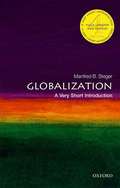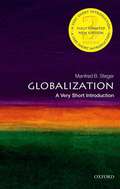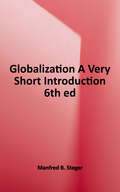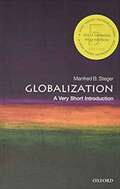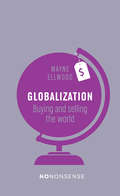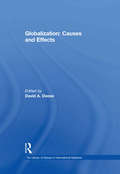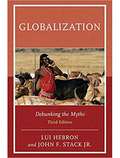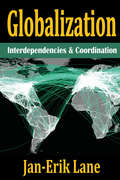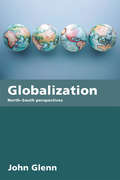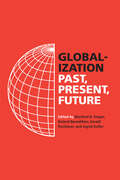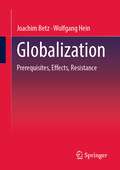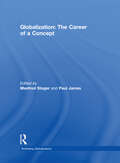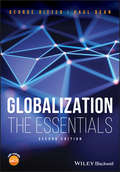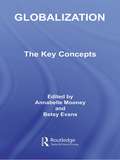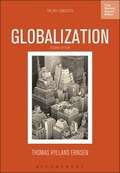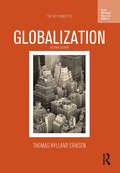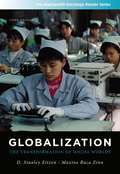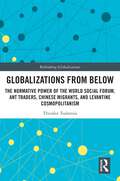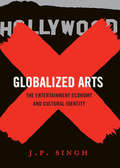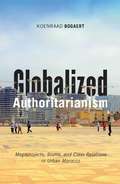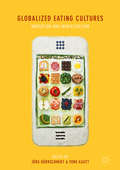- Table View
- List View
Globalization: A Very Short Introduction (Fourth Edition)
by Manfred B. Steger"Globalization" has become one of the defining buzzwords of our time - a term that describes a variety of accelerating economic, political, cultural, ideological, and environmental processes that are rapidly altering our experience of the world. It is by its nature a dynamic topic. This Very Short Introduction has been fully updated for a fourth edition, to include recent developments in global politics, the global economy, and environmental issues. Presenting globalization as a multifaceted process encompassing global, regional, and local aspects of social life, Manfred B. Steger looks at its causes and effects, examines whether it is a new phenomenon, and explores the question of whether, ultimately, globalization is a good or a bad thing. In this fourth edition Steger discusses some of the key features of recent years, such as the EU fiscal crisis, the rise of robot technology and new war technology with civilian usage such as drones, the Ebola epidemic in West Africa, and new identity discussions around gender fluidity and sex change in the media. ABOUT THE SERIES: The Very Short Introductions series from Oxford University Press contains hundreds of titles in almost every subject area. These pocket-sized books are the perfect way to get ahead in a new subject quickly. Our expert authors combine facts, analysis, perspective, new ideas, andenthusiasm to make interesting and challenging topics highly readable.
Globalization: A Very Short Introduction (Third Edition)
by Manfred Steger'Globalization' has become one of the defining buzzwords of our time - a term that describes a variety of accelerating economic, political, cultural, ideological, and environmental processes that are rapidly altering our experience of the world. It is by its nature a dynamic topic - and thisVery Short Introduction has been fully updated for a third edition, to include recent developments in global politics, the global economy, and environmental issues. Presenting globalization in accessible language as a multifaceted process encompassing global, regional, and local aspects of social life, Manfred B. Steger looks at its causes and effects, examines whether it is a new phenomenon, and explores the question of whether, ultimately, globalization is agood or a bad thing.
Globalization: A Very Short Introduction (Very Short Introductions Ser.)
by Manfred B. StegerVery Short Introductions: Brilliant, Sharp, Inspiring We live today in an interconnected world in which ordinary people can become instant online celebrities to millions of fans thousands of miles away, in which religious leaders can influence billions globally, in which humans are altering the climate and environment, in which new infectious diseases spread across continents at lightning speed, and in which complex social forces are increasingly impacted by digital technology. This is globalization. In the sixth edition of his bestselling Very Short Introduction, Manfred B. Steger offers concise definitions of pertinent key terms and concepts. He provides an accessible overview of the long history of globalization followed by an examination of its major dimensions: economic, political, cultural, ideological, and ecological. He also engages the hotly contested question of whether it is, ultimately, a good or a bad thing. From climate change to the COVID-19 pandemic, resurgent nationalism to global social media, trade wars to China's growing global profile, Russia's expansionism to renewed fears of nuclear conflicts, he explores today's unprecedented levels of planetary integration and disruption. About The Series: The Very Short Introductions series from Oxford University Press contains hundreds of titles in almost every subject area. These pocket-sized books are the perfect way to get ahead in a new subject quickly. Our expert authors combine facts, analysis, perspective, new ideas, and enthusiasm to make interesting and challenging topics highly readable.
Globalization: A Very Short Introduction (Very Short Introductions Series)
by Manfred B. StegerWe live today in an interconnected world in which ordinary people can became instant online celebrities to fans thousands of miles away, in which religious leaders can influence millions globally, in which humans are altering the climate and environment, and in which complex social forces intersect across continents. This is globalization. <p><p> In the fifth edition of his bestselling Very Short Introduction Manfred B. Steger considers the major dimensions of globalization: economic, political, cultural, ideological, and ecological. He looks at its causes and effects, and engages with the hotly contested question of whether globalization is, ultimately, a good or a bad thing. From climate change to the Ebola virus, Donald Trump to Twitter, trade wars to China's growing global profile, Steger explores today's unprecedented levels of planetary integration as well as the recent challenges posed by resurgent national populism. <p><p> ABOUT THE SERIES: <p>The Very Short Introductions series from Oxford University Press contains hundreds of titles in almost every subject area. These pocket-sized books are the perfect way to get ahead in a new subject quickly. Our expert authors combine facts, analysis, perspective, new ideas, and enthusiasm to make interesting and challenging topics highly readable.
Globalization: Buying and selling the world (No-Nonsense Guides #37)
by Wayne EllwoodGlobalization has an ever-increasing effect on our lives. It has made the world smaller and brought us closer together yet it can also make us more vulnerable and divided. The deregulation of finance and banking and the crisis they led to is a devastating example of the knock-on effects of globalization. This fully revised fourth edition reviews the history and complexities of globalization, examining the forces in play and whose interests they serve. And while the global exchange of people, products, plants, animals, technologies, and ideas intensifies the key question that Wayne Ellwood asks ‘how can globalization be a positive force for change?’
Globalization: Causes And Effects (The Library of Essays in International Relations)
by David A. DeeseGlobalization: Causes and Effects is the culmination of an eleven volume series that defines and explains the scholarly field of International Relations. Highlighting primary scholarly accomplishments in the field, this final title frames the sub-field of 'Globalization' and documents the fundamental milestones in thinking about and understanding this phenomenon. 'Globalization' is ripe for work integrating a wide range of leading research results and assessing its findings as a whole. Together, the pioneering articles selected for this book represent the most important scholarly contributions published to date on the main dimensions of globalization. The majority of the authors are political scientists, but a substantial number are economists, sociologists and historians. The volume covers Forms, Origins, and Causes; Political Dimensions and Implications; Economic and financial Impacts; Identity, Culture, and Civilization; and The Future of Globalization.
Globalization: Debunking The Myths
by Lui Hebron John F. Stack Jr.Now in a fully revised and updated edition, this balanced and clearly written text explores globalization and its impact from economic, political, social, environmental, and cultural perspectives. Providing a framework and platform for student learning, the book gives readers the tools to unravel the complexities of globalization in all its facets. Lui Hebron and John Stack note that as a hot-button term, globalization is used to describe any number of changes within, among, and between societies and states. Their goal is to reduce the noise engulfing debates and interpretations of one of the most dynamic, contested, applauded, and disparaged phenomena of the twenty-first century. Arguing that current assessments—both positive and negative—of globalization are overblown, the authors treat the dramatically changing landscapes of world politics as less a revolution than an evolution of already established structures and patterns of transnational relations. They trace how globalization has affected individuals, societies, states, and intergovernmental and supranational organizations. Making sense of a world seemingly smaller and incomprehensibly larger, simultaneously centralizing and fragmenting, Globalization: Debunking the Myths offers both an indispensable introduction for undergraduates and a concise review for more advanced students.
Globalization: Interdependencies and Coordination
by Hugh DaunceyEfforts at coordination between nations are at the heart of the challenges of globalization. Despite steadily growing interdependencies, individual nations still have specific interests that present obstacles to globalization. While some challenges inspired by the need to coordinate are viewed as inevitable by many, they are less optimistic about prospects for success. Jan-Erik Lane argues that one should focus objectively upon the possibility of failures.Lane analyzes four kinds of challenges to interdependency, all of which are growing in geopolitical relevance. First, countries need to diminish their dependency on fossil fuel and shift to a reliable supply of energy, because fossil fuels are diminishing. Second, environmental degradation must be addressed, because it is accelerating under the strain of earth's population. Lane advocates an ecological footprint approach. Third, a single global market economy and its complexities must be addressed, as national economies are increasingly opened. Finally, as traditional state sovereignty weakens, foreign military intervention in both international and intra-state conflicts increases.Governments are attempting to address these interdependencies, or reply to the challenges they pose, mainly through international organizations and regionalism. These efforts are discussed at length. In addition, problems with international law are reviewed, as Lane warns against the utopian hopes of global constitutionalism. Globalization also examines the potential consequences of failing to address the need for coordination in efforts to address shared global challenges.
Globalization: North-South Perspectives
by John GlennRather than claim that there exists a common concept of globalization that all parties can agree to, this book seeks to examine some of the conceptions and the way in which they render different interpretations of particular aspects of globalization. The last two decades have witnessed an explosive proliferation of academic writings on the subject of globalization, which has been accompanied by a high level of interest in the media and widespread usage of the term. This has inevitably resulted in the meaning of the concept broadening to include a whole host of issues, running the attendant risk of losing any conceptual focus it had. John Glenn examines five issue areas affected by globalization: the economy sovereignty civil society governance communication. In so doing, the book aims to articulate certain questions within each area, which will allow for some judgment to be made concerning the differing perspectives on globalization. Globalization will be of interest to students of international political economy and politics and international relations in general.
Globalization: Past, Present, Future
by Manfred B. Steger, Roland Benedikter, Harald Pechlaner, and Ingrid KoflerA free ebook version of this title is available through Luminos, University of California Press’s Open Access publishing program. Visit www.luminosoa.org to learn more. Since the end of the Cold War, globalization—the process and the idea—has been reshaping the world. Global studies scholarship has emerged to make sense of the transnational manifestations of globalization: economic, social, cultural, ideological, technological, environmental, and postcolonial. But a series of crises in the first two decades of the twenty-first century has put the neoliberal globalization system of the 1990s under severe strain. Are we witnessing a turn toward "deglobalization," intensified by the COVID-19 pandemic and the war in Ukraine or a moment of "reglobalization," spearheaded by digital technology? The contributors to this book employ transdisciplinary research to assess past developments, the current state, and future trajectories of globalization in light of today’s dynamics of insecurity, volatility, and geopolitical tensions.
Globalization: Prerequisites, Effects, Resistances
by Joachim Betz Wolfgang HeinThis textbook deals with the progressive global dissolution of political, economic, and social boundaries, which has significant implications for labor markets, the international division of labor, social security, and income distribution. Politically, it is eroding the sovereign ability of nation-states to shape their own affairs; socially, it conjures up the specter of an increasingly global culture of unity. Against the background of the empirical effects of globalization processes in a number of areas, the book discusses to what extent these fears are justified, whether they cannot also be explained by other developments, and whether the benefits of globalization justify the costs and risks resulting from it.
Globalization: The Career of a Concept (ISSN)
by Manfred B. Steger and Paul JamesOne of the keywords of our time, ‘globalization’ frames how we understand our interconnected world. An ambiguous signifier carrying multiple meanings, the term is usually used to refer to the extension and intensification of social relations across the world. Many works have been authored that deal with various aspects of globalization. However, it is surprising that no critical history of the concept has yet provided a historical mapping of its conceptual origins, evolution, and genealogical lineages. This book investigates the meaning formation of ‘globalization’ by featuring interviews with twelve prominent academic pioneers of the new trans-disciplinary field of Global Studies, who were central in forging the ‘career ‘of the concept of ‘globalization’. Together with an introductory chapter, these interviews clarify how and why a previously obscure scholarly concept suddenly exploded in the public discourse of the 1990s. In particular, the interviews trace the processes by which economistic discourses of free market economics became the basis for the influential association of the meaning of ‘globalization’ with the dominant neoliberal framework of the 21st century. This book was originally published as a special issue of Globalizations.
Globalization: The Essentials
by George Ritzer Paul DeanA concise exploration of globalization and its role in the contemporary era Driven by technological advancements and global corporations, more and more people are swept up by globalizing processes, creating new winners and losers. Globalization: The Essentials explores the flows, structures, processes, and consequences of globalization in the modern economic, political, and cultural landscape. This comprehensive introduction offers balanced coverage of areas such as global economic and cultural flows, environmental sustainability, the impact of technology, and racial, economic, and gender inequality — providing readers with foundational knowledge of globalization. Extensively revised and updated, this second edition includes expanded coverage of human trafficking and migration, global climate change, fake news and information wars, and transnational social movements with increased emphasis on examples from Central and South America, Africa, and Asia: Offers a straightforward approach to the multiple facets of globalization and their positive and negative influences on contemporary society Employs unique metaphors and a coherent narrative structure to promote intuitive understanding of abstract concepts Introduces cutting-edge research, updated statistics, and real-world examples in areas such as rising global populism, social justice movements, blockchain technology, and cryptocurrencies Provides an efficient and flexible pedagogical structure, allowing integration with instructor’s own course material Emphasizing student comprehension, a wide range of source material is incorporated including empirical research, relevant theories, newspaper and magazine articles, and popular books and monographs. Examples of current research and recent global developments, such as emerging economies and global health concerns, encourage classroom discussion and promote independent study. Globalization: The Essentials — a compact edition of the authors’ full-sized textbook Globalization: A Basic Text — provides concise coverage of the central concepts of this dynamic field. Offering a multidisciplinary approach, this textbook is an invaluable primary or supplemental resource for undergraduate study in any social science field, as well as coursework on economics, migration, inequality and stratification, and politics.
Globalization: The Key Concepts (Routledge Key Guides)
by Annabelle Mooney Betsy EvansViewed as a destructive force or an inevitability of modern society, globalization is the focus of a multitude of disciplines. A clear understanding of its processes and terminology is imperative for anyone engaging with this ubiquitous topic. Globalization: the Key Concepts offers a comprehensive guide to this cross-disciplinary subject and covers concepts such as: homogenization neo-Liberalism risk knowledge society time-space compression reflexivity. With extensive cross-referencing and suggestions for further reading, this book is an essential resource for students and interested readers alike as they navigate the literature on globalization studies.
Globalization: The Key Concepts (Second Edition)
by Thomas Hylland EriksenThis new edition of Thomas Hylland Eriksen's concise and engaging landmark textbook outlines the main debates and controversies around globalization, and develops a unique perspective to show how globalization is an inherently double process, taking place both from above and below. Each chapter is supported by boxed case studies and bullet points summarizing the core information, suggestions for further reading, and essay and discussion questions, making this the ideal guide for both the classroom and independent study. Focusing on key concepts of globalization and drawing on international examples, this book is essential for anyone wishing to understand the fundamental processes underlying the contemporary world and the consequences these have for all of us.
Globalization: The Key Concepts (The Key Concepts)
by Thomas Hylland EriksenFor the first time in human history, the vast majority of the world’s population is connected through trade, travel, production, media and politics. Ours is an era of ubiquitous mobile communication, economic outsourcing, mass migration and imported consumer goods. At the same time, people everywhere are concerned to keep their identities rooted and sense of place in the face of momentous change.This new edition of Thomas Hylland Eriksen’s concise and engaging landmark textbook outlines the main debates and controversies around globalization, and develops a unique perspective to show how globalization is an inherently double process, taking place both from above and below. Each chapter is supported by boxed case studies and bullet points summarizing the core information, suggestions for further reading, and essay and discussion questions, making this the ideal guide for both the classroom and independent study. Focusing on key concepts of globalization and drawing on international examples, this book is essential for anyone wishing to understand the fundamental processes underlying the contemporary world and the consequences these have for all of us.
Globalization: The Return of Borders to a Borderless World?
by Richard W. Mansbach Yale H. FergusonWritten by two leading scholars of global politics, Globalization: the return of borders to a borderless world? is a major new book for students of globalization. It describes and explains globalization and its origins, and examines its future in light of key recent political and global trends and events. The text: identifies the different political, economic, technological, and cultural meanings of globalization examines its historical origins from the ancient past through the Cold War and into the twenty-first century describes the multiple attributes and consequences of globalization including its effect on the sovereignty of the nation state discusses recent trends such as the increased use of social media and events like the Arab Spring assesses the normative implications of globalization analyzes the challenges to globalization posed by contemporary events such as the global financial crisis. This book will be essential reading for all students of globalization, and will be of great interest to students of global politics and global governance.
Globalization: The Transformation of Social Worlds (Third Edition)
by D. Stanley Eitzen Maxine Baca ZinnThis popular and thought-provoking reader collects interesting and insightful articles that explore the process of globalization and how it shapes societies and groups. The articles, which reflect a wide variety of concerns and perspectives, are drawn from both scholarly and popular sources.
Globalization: What's New
by Michael M. WeinsteinWith original contributions from ten eminent economists, this collection presents diverse and original perspectives on globalization. The contributors analyze recent trends in trade, immigration, and capital flows; why some poor countries have grown while others have stagnated during the past two decades; globalization's impact on jobs and wages in poor countries and in the United States; the surprising environmental benefits of globalization; the degree to which foreign aid helps developing countries; the failures of international institutions to govern the global economy and supporting democracy; and how foreign loans and investments can wreak havoc on a nation's economy.
Globalization: What's New? (Globalization And Community Ser. #54)
by Ed. Weinstein Michael M.From the streets of Seattle to corporate boardrooms to new factories in third-world nations, globalization is subject to very different and often explosively divergent interpretations. Where some see globalization as driving poor countries into further poverty, others see it as the path to economic salvation and democratic rule. With original contributions from ten eminent economists, Globalization: What's New cuts through the confusion and rhetoric to offer straightforward, incisive analysis of globalization and its future.Coming from some of globalization's most prominent supporters (David Dollar), its most vocal critics (Joseph Stiglitz), and those in-between, this collection presents diverse and original perspectives on globalization's immense reach that dig to the core of many debates. The contributors analyze recent trends in trade, immigration, and capital flows; why some poor countries have grown while others have stagnated during the past two decades; future opportunities for low-wage workers; globalization's impact on jobs and wages in poor countries and in the United States; the surprising environmental benefits of globalization; the degree to which foreign aid helps developing countries; the failures of international institutions in governing the global economy and supporting democracy; and how foreign loans and investments can wreak havoc on a nation's economy.
Globalizations from Below: The Normative Power of the World Social Forum, Ant Traders, Chinese Migrants, and Levantine Cosmopolitanism (Rethinking Globalizations)
by Theodor TudoroiuGlobalizations from Below uses a Constructivist International Relations approach that emphasizes the centrality of normative power to analyze and compare the four globalizations ‘from below’. These are: (1) the counter-hegemonic globalization represented by the ‘movement of movements’ of alter-globalization transnational social activists, who try to put an end to the Neoliberal nature of the Western-centered globalization ‘from above;’ (2) the non-hegemonic globalization enacted by ‘ant traders’ that are part of the transnational informal economy; (3) the partially similar Chinese-centered globalization, whose entrepreneurial migrants are strongly influenced and instrumentalized by the Chinese state; and (4) the first wave globalization ‘from below’ that paralleled (and outlived) the 1870–1914 globalization ‘from above.’ This book identifies their common features and uses them to define the concept of globalization ‘from below’ as a set of socio-economic or socio-political processes that involve large transnational flows of people, goods, and/or ideas characterized at least in part by informality. They are enacted by entrepreneurial or activistic individuals who either take advantage of the normative power of the hegemon at the origin of an international order and an associated globalization ‘from above,’ or — explicitly or implicitly — transgress, contest, and try to redefine dominant economic, legal, political, and socio-cultural norms, thus challenging the existing international order and globalization ‘from above.’ By constructing a unified theoretical framework, this book attempts to open a new field of interdisciplinary research that should take globalizations ‘from below’ out of their current scholarly marginality. This is one of the first scholarly works to collectively present more than one globalization ‘from below,’ and will be of great interest to students, scholars, and researchers of International Relations, International Political Economy, Development Studies, Economic History, Anthropology, Diaspora Studies, and Chinese Studies.
Globalized Arts: The Entertainment Economy and Cultural Identity
by J. P. SinghOur interactive world can take a cultural product, such as a Hollywood film, Bollywood song, or Latin American telenovela, and transform it into a source of cultural anxiety. What does this artwork say about the artist or the world she works in? How will these artworks evolve in the global market? Film, music, television, and the performing arts enter the same networks of exchange as other industries, and the anxiety they produce informs a fascinating area of study not only for art and culture but also for global politics. Focusing on the confrontation between global politics and symbolic creative expression, J. P. Singh shows how, by integrating themselves into international markets, entertainment industries give rise to far-reaching cultural anxieties. With examples from Hollywood, Bollywood, French grand opera, Latin American television, West African music, postcolonial literature, and even the Thai sex trade, Singh cites both the attempt to address cultural discomfort and the effort to deny entertainment acts as cultural. He connects creative expression to clashes between national identities, and he details the effect of cultural policies, such as institutional patronage and economic incentives, on the making and incorporation of art into the global market. Ultimately, Singh shows how these issues impact the debates on cultural trade being waged by the World Trade Organization, UNESCO, and the developing world.
Globalized Arts: The Entertainment Economy and Cultural Identity
by J. P. SinghOur interactive world can take a creative product, such as a Hollywood film, Bollywood song, or Latin American telenovela, and transform it into a source of cultural anxiety. What does this artwork say about the artist or the world she works in? How will these artworks evolve in the global market? Film, music, television, and the performing arts enter the same networks of exchange as other industries, and the anxiety they produce informs a fascinating area of study for art, culture, and global politics.Focusing on the confrontation between global politics and symbolic creative expression, J. P. Singh shows how, by integrating themselves into international markets, entertainment industries give rise to far-reaching cultural anxieties and politics. With examples from Hollywood, Bollywood, French grand opera, Latin American television, West African music, postcolonial literature, and even the Thai sex trade, Singh cites not only the attempt to address cultural discomfort but also the effort to deny entertainment acts as cultural. He connects creative expression to clashes between national identities, and he details the effect of cultural policies, such as institutional patronage and economic incentives, on the making and incorporation of art into the global market. Ultimately, Singh shows how these issues affect the debates on cultural trade being waged by the World Trade Organization, UNESCO, and the developing world.
Globalized Authoritarianism: Megaprojects, Slums, and Class Relations in Urban Morocco (Globalization and Community #27)
by Koenraad BogaertA rich investigation into Morocco&’s urban politics Over the past thirty years, Morocco&’s cities have transformed dramatically. To take just one example, Casablanca&’s medina is now obscured behind skyscrapers that are funded by global capital and encouraged by Morocco&’s monarchy, which hopes to transform this city into a regional leader of finance and commerce. Such changes have occurred throughout Morocco. Megaprojects are redesigning the cityscapes of Rabat, Tangiers, and Casablanca, turning the nation&’s urban centers into laboratories of capital accumulation, political dominance, and social control.In Globalized Authoritarianism, Koenraad Bogaert links more abstract questions of government, globalization, and neoliberalism with concrete changes in the city. Bogaert goes deep beneath the surface of Morocco&’s urban prosperity to reveal how neoliberal government and the increased connectivity engendered by global capitalism transformed Morocco&’s leading urban spaces, opening up new sites for capital accumulation, creating enormous class divisions, and enabling new innovations in state authoritarianism. Analyzing these transformations, he argues that economic globalization does not necessarily lead to increased democratization but to authoritarianism with a different face, to a form of authoritarian government that becomes more and more a globalized affair.Showing how Morocco&’s experiences have helped produce new forms of globalization, Bogaert offers a bridge between in-depth issues of Middle Eastern studies and broader questions of power, class, and capital as they continue to evolve in the twenty-first century.
Globalized Eating Cultures: Mediation and Mediatization
by Jörg Dürrschmidt York KauttThis innovative volume explores the link between local and regional eating cultures and their mediatization via transnational TV cooking shows, glocal food advertising and social media transfer of recipes. Pursuing a global and interdisciplinary approach, it brings together research conducted in Latin America, Australia, Africa, Asia and Europe, from leading scholars in sociology and political science, media and cultural studies, as well as anthropology. Drawing on this rich case study material facilitates a revealing and engaging analysis of the connection between the meta-concepts of globalization and mediatization. Across fifteen chapters its authors provide fresh insights into the different impact that food and eating cultures can have on the everyday mediation of ethnicity and class as well as local, regional and transnational modes of belonging in a media rich global environment. This exciting addition to the food studies literature will appeal in particular to students and scholars of sociology, anthropology, media and cultural studies.
